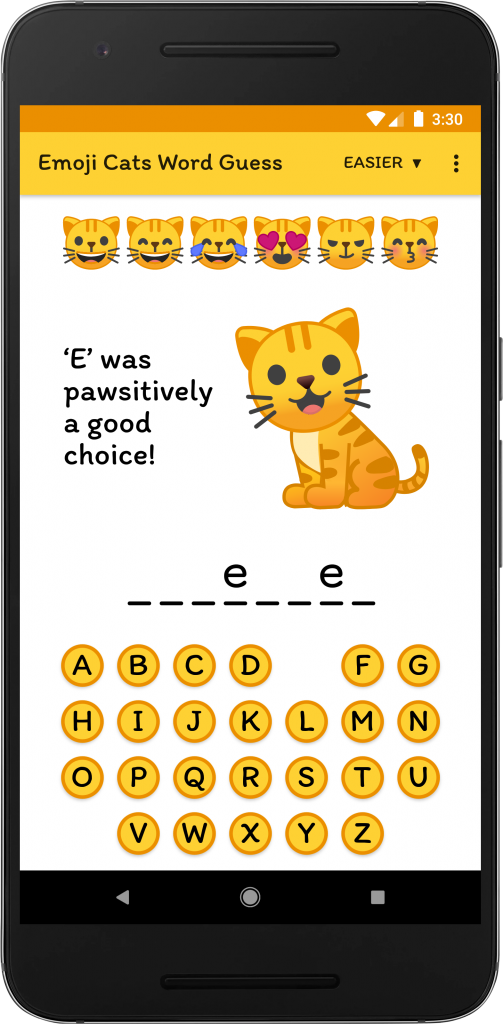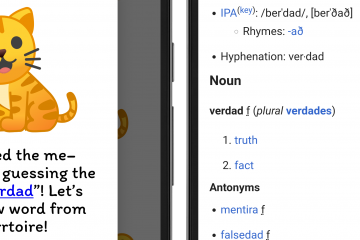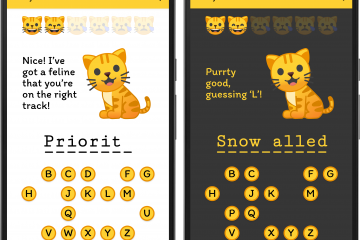As someone who has had Etaoin Shrdlu burned into her brain for many many years, it surprises me to see some people seeming to just randomly guess letters without having any kind of system when playing Emoji Cats Word Guess and other word-guessing games.
In this post I’ll talk about some techniques that can make it easier to correctly guess words with each of Emoji Cats Word Guess’s six dictionary settings. This will be about how I do it, anyway — you might come up with some more refined approaches and/or find other approaches more enjoyable.
Letter frequency lists
Lists of the most-frequently-used letters for each language are very helpful for word-guessing games. How common different letters are in words in a language varies over time and by source material, but for English words (used in Emoji Cats Word Guess’s Easier, Harder, and to some extent in Swords, dictionaries), I’m going to give you the classic linotype sequence “ETAOINSHRDLUCMFWYPVBGKJQXZ” as a good general rule, and you’ll find ECWG-specific Spanish, German, and French letter-frequency sequences in the Spanish, German, and French sections below.
I’m not saying that you need to be looking at this (or the Spanish, German, or French) sequence every time you play Emoji Cats Word Guess, only that it can make things much easier to have a general idea about which letters are more commonly used than others in the language you’re working with.
Also, the point with “ETAOINSHRDLUCMFWYPVBGKJQXZ” and the other letter-frequency lists is not to just tap each of the letters in order until you either correctly guess the word or run out of guesses, the point is to try the first letter, the second letter, etc. until enough letters have been revealed and/or ruled out that you can start making educated guesses about what the whole word or a part of the word (for example, recognizing common word endings) is.
Longer vs shorter words
It may seem counterintuitive, but generally (other than one-letter words) longer words are easier — the more letters, the more likely you are to guess at least some of them before making six mistakes, and then to be able to look at the resulting arrangement of letters and spaces and try to figure out which word it is, or which letters would be likely to go next to some of the letters that you’ve already guessed. With a short word like “Fly”, on the other hand, you may run out of guesses before correctly guessing any of the letters, if none of them are all that common.
With shorter words, say four or fewer letters, in my opinion you should start out by guessing just vowels, and as soon you’ve got one or two of them revealed, then think about which consonants could form valid words of that length with those vowels in those positions.
Easier
Emoji Cats Word Guess’s Easier dictionary is from a list of “core high frequency vocabulary words for students of English as a second language”, so all the words should be very familiar, making them easier to guess/recognize once you’ve guessed at least some of the letters.
English words have many common word endings such as able, ally, ance, ence, ment, sion, tion, tive, and ture — if you’ve already guessed some of the letters at/toward the end of a word, and they and their nearby empty spaces are in the right places to be a common word ending, try guessing the other letters in that common word ending.
Harder
Because the almost 150,000 words in the Harder dictionary include a lot of specialized terminology, obscurities, alternate spellings, and so on, many of the words can be much less predictable in terms of ordinarily common letters, letter combinations, word endings, and so on.
Like the other dictionaries, the more times you play Emoji Cats Word Guess with the Harder dictionary setting, the more of a feel you get for the kinds of words that are in it and the kinds of structures they can have. For example, in addition to the common word endings mentioned in Easier above, you’ll be seeing all kinds of word variations with different prefixes and suffixes, different verb conjugations and tenses, both singular and plural noun variations, compound words involving chemistry, biology, minerals, and so on. Basically, yeah, if you enjoy the challenge of Harder, keep playing it, and you’ll gradually be correctly guessing more and more words as you, again, get more of a feel for it.
Swords
To quote from Swords in Emoji Cats Word Guess?, “One thing that can make Swords pretty hard is that as it contains swords from many different countries/languages/eras/works of fiction/etc. it can be hard to predict good common letters or letter combinations to guess.” Because the Swords dictionary only contains 150 swords (as opposed to many many thousands of words like the other four dictionaries), I actually listed all of them along with brief descriptions in the blog post linked to at the beginning of this paragraph — check it out, and you’ll see what I mean about why some of them could be difficult to guess.
I will point out, though, that because 149 of the 150 contain at least one of the aeiou vowels (the odd one out opting for “and sometimes y” instead), I’d recommend starting out by guessing vowels, to get at least some of a sword filled in before trying to figure out the consonants.
Spanish
The most-frequently-used-letters sequences are different in English and Spanish in general, but I’m going to give you an ECWG-specific Spanish-letter-frequency sequence “AREOINCTSLDUMPGBVFHZJQXYKW” for two reasons:
- With Spanish, Emoji Cats Word Guess uses the A, E, I, O, U, and N letter buttons as wildcards for both the unaccented and accented versions of those letters, with each wildcard letter combining the frequencies for its pair of letters.
- Verbs in Emoji Cats Word Guess’s Spanish dictionary are in their infinitive forms (for example, just hablar without including hablo, hablas, habla, hablamos, and hablan as well), among other things increasing the dictionary’s relative frequencies of the letters a, e, i, and r.
Emoji Cats Word Guess’s Spanish dictionary is adapted from a list of 5,000 most-frequently-used Spanish words, therefore more or less familiar words to Spanish speakers/learners of all levels, making them relatively easy to guess/recognize once you’ve guessed at least some of the letters.
As with English, Spanish has a lot of common word endings. Because, again, all verbs in Emoji Cats Word Guess’s Spanish dictionary are in their infinitive forms, a lot of words end in either ar, er, or ir. Some other common word endings are ador, ante, ario, ente, ento, idad, ncia, ntar, and tico, and as you continue to play, you’ll be noticing others as well. The point here is that if you’ve already guessed some of the letters at/toward the end of a word, and they and their nearby empty spaces are in the right places to be a common word ending, try guessing the other letters in that common word ending.
German
The most-frequently-used-letters sequences are different in English and German in general, but I’m going to give you an ECWG-specific German-letter-frequency sequence “ENRIATSHULGCOBMDFKZWVPJYXQ” for two reasons:
- With German, Emoji Cats Word Guess uses the A, O, and U letter buttons as wildcards for both the non-umlaut and umlaut versions of those letters, and the S letter button as a wildcard for both s and ß (“eszett”/”sharp S”), with each wildcard letter combining the frequencies for its pair of letters.
- Verbs in Emoji Cats Word Guess’s German dictionary are in their infinitive forms (for example, just sprechen without including spreche, sprichst, spricht, and sprecht as well), among other things increasing the dictionary’s relative frequencies of the letters e and n.
Emoji Cats Word Guess’s German dictionary is adapted from a list of 5,000 most-frequently-used German words, therefore more or less familiar words to German speakers/learners of all levels, making them relatively easy to guess/recognize once you’ve guessed at least some of the letters.
As with English, German has a lot of common word endings. Because, again, all verbs in Emoji Cats Word Guess’s German dictionary are in their infinitive forms, a lot of words end in en, (and a smaller number in ern, or eln). Some other common word endings are chen, eben, ehen, eren, igen, isch, lich, rung, and ssen, and as you continue to play, you’ll be noticing others as well. The point here is that if you’ve already guessed some of the letters at/toward the end of a word, and they and their nearby empty spaces are in the right places to be a common word ending, try guessing the other letters in that common word ending.
French
The most-frequently-used-letters sequences are different in English and French in general, but I’m going to give you an ECWG-specific French-letter-frequency sequence “ERINTAOSCULMPDGFVBHQXYJZKW” for two reasons:
- With French, Emoji Cats Word Guess uses the A, E, I, O, and U letter buttons as wildcards for both the unaccented and accented versions of those letters, A and O also serving as wildcards for the ligatures æ and œ, and the C letter button as a wildcard for both c and ç (“c cédille”), with each wildcard letter combining the frequencies for all the letters it’s a wildcard for.
- Verbs in Emoji Cats Word Guess’s French dictionary are in their infinitive forms (for example, just parler without including parle, parlons, parles, parlez, and parlent as well), among other things increasing the dictionary’s relative frequencies of the letters e, r, and i.
Emoji Cats Word Guess’s French dictionary is adapted from a list of 5,000 most-frequently-used French words, therefore more or less familiar words to French speakers/learners of all levels, making them relatively easy to guess/recognize once you’ve guessed at least some of the letters.
As with English, French has a lot of common word endings. Because, again, all verbs in Emoji Cats Word Guess’s French dictionary are in their infinitive forms, a lot of words end in er, re, and ir. Some other common word endings are able, aire, ance, ique, ment, sion, teur, and tion, and as you continue to play, you’ll be noticing others as well. The point here is that if you’ve already guessed some of the letters at/toward the end of a word, and they and their nearby empty spaces are in the right places to be a common word ending, try guessing the other letters in that common word ending.




1 Comment
Emoji Cats Word Guess is a language-learning app too – Emoji Cats Word Guess · March 31, 2020 at 8:32 pm
[…] guessing letters you’re thinking about how words in that language are structured — which letters are most commonly used, which letters often go together, common prefixes and suffixes, and so on. As you start to fill in […]